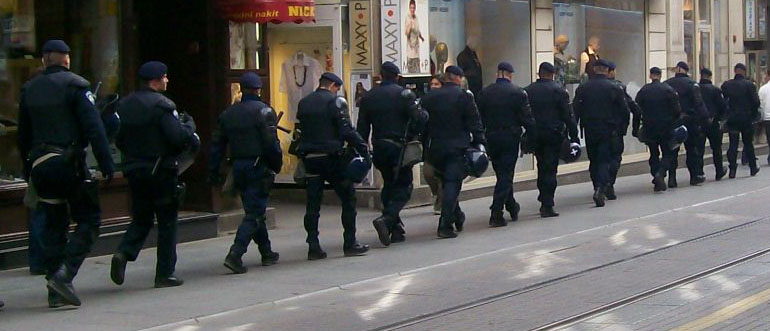The London Summit Topics (4): Security Issues

Politicisation of Human Resources Management in Western Balkans Police Services Influences Investigations
The decisions on employment, promotions, and dismissals are effective channels for influencing behaviour of law enforcement professionals. Without adequate system of checks and balances in place to ensure that the capable police professionals with integrity have secure jobs and prospects for career advancement, even when they confront interests of political parties or powerful criminal syndicates, they are unable to effectively perform core police tasks, such as preventing and suppressing crime or providing non-discriminatory protection to all citizens. This is why there is a strong focus by Western Balkan civil society on systematic monitoring of reforms in police at national and regional levels.
The existing hiring and promotion procedures in the Western Balkan police services are not competitive, and there is a significant turnover and weak retention of most experienced officers with integrity. This is due to the lack of standard procedures for human resources management and weak professional capacity of human resources (HR) departments, as well as high political interference in day-to-day human resources decisions. Such practices affect police effectiveness, as well as the perceptions of the public and police. Most law enforcement agencies in the Western Balkan region have undertaken steps in recent several years to establish professional human resources management systems (HRM) that will introduce transparent and merit-based recruitment, career development, promotion and dismissals.
![Photo: Suradnik13 [CC BY-SA 4.0], from Wikimedia Commons](http://wb-csf.eu/wp-content/uploads/2018/06/Interventna_policija-300x129.jpg)
The biggest obstacle to the introduction of functioning merit-based HR in law enforcement is deep politicisation of human resources management. For example, the minister of interior in Serbia is involved in recruitment of all employees selected through public competition by: a) making a decision in each case on the need for opening the call for recruitment, b) appointment of members of Selection Committee, c) selection of candidate based on the proposal from the Selection Committee and d) signing employment decision for each new employee. In case of internal competition for higher ranks and specialized posts within the police hierarchy, the minister is in charge of a) deciding on the way of conducting internal competition, b) appointment of members of Selection Committee for filling mid- and senior-level posts and c) signing employment for each promotion or transfer. Having in mind that the Serbian police recruits around 100 new employees each year, and that theoretically 42 426 police officers can apply at internal competitions, such a system keeps the ineffective centralization of decision-making, and enables discretionary interference of political leader in human resources management. In Montenegro, the Minister of Interior can decide not to select the first-ranked candidate for the job or promotion. Based on the data collected by Institute Alternative, out of 56 cases involving more than one candidate for a single job position in 2015, the minister decided not to select the top ranked candidate in 12.5% of the cases.
Such arrangements are conducive to state capture or legal interference in how police organisation is run for the sake of protection of private group interests e.g. who is going to be investigated and who is going to be exempted from police action. It is no wonder then that physical assaults on the investigative journalists and other civil society actors by informal security actors have rarely been properly investigated. Moreover, politicisation of the HR has facilitated opening of police services to the people with links to crime or even to those who have committed crimes. For example, in the Police of Sarajevo Canton, more than 300 police officers have not passed security vetting. Serbian media have documented cases of police officers working as close protection for known criminals, as well as the link between a police officer of specialised police unit – Gendarmerie to a sentenced football hooligan.
The HR management politicisation has also led to loosing talent of experienced law enforcement officers with integrity through transfers, demotions without clear criteria or retirements at the earliest point in time. In Montenegro, demotion of police staff has also proved to be problematic – it happens without proper explanations, and frequently the decisions on transfer to another unit are taken retroactively after placement. Given that the consent of employees for reassignment to different job positions is not required, there is a high risk of abusing this institute. Similar situation is in Serbia where some of the most seasoned investigators that have personally led the most sensitive investigations – such as the assassination of Zoran Đinđić, the first democratic PM, or the Šarić clan – have been demoted or sent to retirement as soon as they reached minimum conditions for retirement. Another practice used to condition loyalty of professionals to politicians is not giving tenure to senior managers, but – as evident from Kosovar practice – filling various positions with Acting Officers (AOs) instead. Another indicator of politicization of the police is the high rate of staff turnover, especially pronounced in Albania after the changes of government. The most prominent case was the misuse of rationalization process in Serbian police to lay off 1,696 employees under the new legislation limiting the number of employees in the public sector. Prior to losing their job, these people were allocated to the newly established job post of ‘risk assessor’ that was then pronounced redundant. This was done without clear criteria and the people on the list included police officers sentenced for criminal offences, as well as some of the most senior police investigators that had led the most sensitive investigations on organized crime, political assassinations, as well as specialized financial investigators. This process was cancelled after numerous appeals by those affected.
Therefore, the key to developing professionalism and nurturing talent in security and law enforcement institutions is in limiting political interference in recruitment, selection, development and promotions of professional staff, introduction of merit-based and equal opportunities HR management practices, and strengthening of internal affairs and external oversight over both political and professional leadership of law enforcement institutions. In the EU accession process, the reform of police organisation should be a benchmarkfor all Western Balkan (WB) countries. A professional, reliable and efficient police organisation is of paramount importance for effective fight against corruption, organised crime, and terrorism, and for the citizens’ trust in state government. Therefore, further professionalization of police services and building of organisational and individual integrity of law enforcement need to be supported through independent monitoring by WB6 civil society and European Commission, and regional exchanges among police services. The outcome of strengthening professionalization and integrity in the law enforcement should be that police services are operationally independent from political interests and shielded from criminal influence.
Sonja Stojanović Gajić, Director, Belgrade Centre for Security Policy
